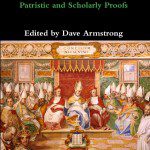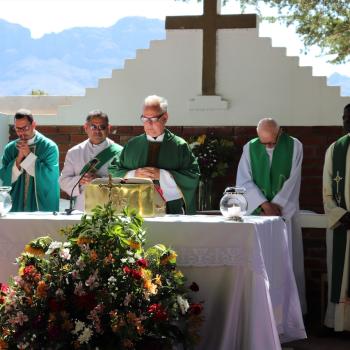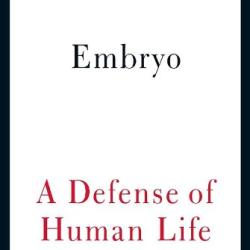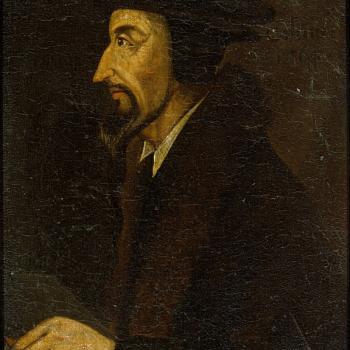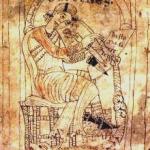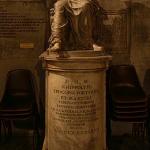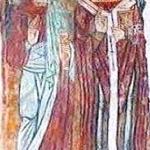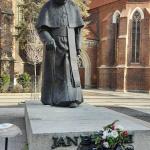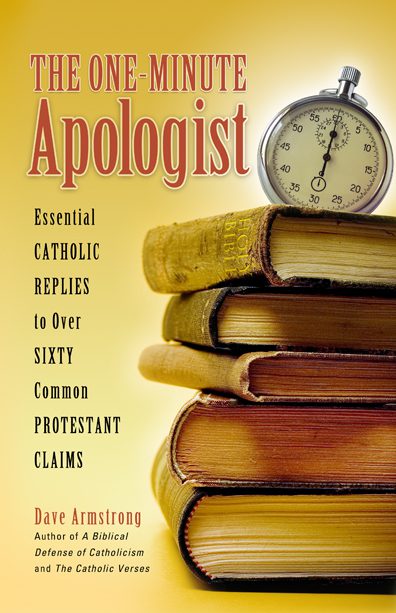
*****
(in the year 1532; from Protestant Luther biographer Roland H. Bainton, Studies on the Reformation [Boston: Beacon Press, 1963], p. 26; primary source: WA [Werke, Weimar edition in German], XXX, 552; bracketed comment is Bainton’s own)
Robert McAfee Brown (Protestant scholar) [p. 7]
“Much of this may be due to faulty reading and faulty listening. But it cannot all be explained so simply. It can be explained only by recognizing honestly that Protestants do not rely on sola Scriptura in quite the pure way that Reformation Sunday sermons would suggest.”(
The Spirit of Protestantism, London: Oxford University Press, 1961, 215-216)
James Gairdner (Protestant Church historian) [p. 13]
(Lollardy and the Reformation in England, Vol. 1 of 4, 1908, 105, 117)
“. . . and the accounts of Irenaeus, Tertullian, Eusebius, and Jerome, that the same apostle nominated and ordained Polycarp (with whom Irenaeus was personally acquainted) bishop of Smyrna.”
(History of the Christian Church, Vol. II: Ante-Nicene Christianity: A.D. 100-325, Grand Rapids, MI: Eerdmans, 1970; from the 5th revised edition of 1910, 135-136)
” . . . [Matt. 22:30]. Our weakness does not allow us to be dismissed from her school until we have been pupils all our lives. Furthermore, away from her bosom one cannot hope for any forgiveness of sins or any salvation, as Isaiah [Isa. 37:32] and Joel [Joel 2:32] testify . . .”
(Institutes of the Christian Religion, edited by John T. McNeill; translated by Ford Lewis Battles, Philadelphia: The Westminster Press, 1960, IV, 1, 4; Vol. 2, p. 1016)
Philip Schaff (Protestant Church historian) [p. 21]
James D.G. Dunn (Protestant New Testament Scholar) [p. 23]
(Unity and Diversity in the New Testament, London: SCM Press, second edition, 1990, 192-193; glossalalia is the Greek word for tongues)
Bertrand Conway [p. 25]
“Neither excommunication nor anathemas imply the Church’s condemning anyone to hell. That is the prerogative of God alone. Excommunication is a Church law, excluding a notorious sinner from the communion of the faithful (Canons 2257-2267). Its purpose is to warn the sinner of the danger he runs of incurring eternal ruin, unless he repent of his sin. The “delivering of the sinner to Satan,” which we find in the Roman Pontifical, is based on the words of St. Paul, who delivered the incestuous sinner to Satan, “that his spirit might be saved in the Day of the Lord Jesus Christ” (1 Cor. 5:5; cf. 1 Tim. 1:20).”
(The Question Box, New York: The Paulist Press, 205)
Ronald Knox [p. 27]
(University and Anglican Sermons, London: Burns and Oates, 1963, 63)
H. Richard Niebuhr (Protestant Theologian) [p. 29]
(The Social Sources of Denominationalism, New York: The World Publishing Co. / Meridian Books, 1957; originally 1929, 25)
The Catholic Encyclopedia [p. 31]
(Vol. VI, 1909, “Galileo Galilei,” John Gerard)
James D.G. Dunn (Protestant Bible scholar) [p. 35]
(Unity and Diversity in the New Testament, London: SCM Press, 2nd edition, 1990, 385; cited in agreement by Bruce in the work above, pp. 42-43)
The New Bible Dictionary (Protestant reference work) [p. 37]
(general editor: J.D. Douglas; Grand Rapids, MI: Eerdmans Pub. Co., 1962, “Power,” section III: “The Power of the Keys,” by R.N. Caswell, pp. 1017-1018)
R.T. France (Anglican Bible commentator) [p. 39]
“Jesus now sums up Peter’s significance in a name, Peter . . . It describes not so much Peter’s character (he did not prove to be ‘rock-like’ in terms of stability or reliability), but his function, as the foundation-stone of Jesus’ church. The feminine word for ‘rock’, ‘petra’, is necessarily changed to the masculine ‘petros’ (stone) to give a man’s name, but the word-play is unmistakable (and in Aramaic would be even more so, as the same form ‘kepha’ would occur in both places). It is only Protestant overreaction to the Roman Catholic claim . . . that what is here said of Peter applies also to the later bishops of Rome, that has led some to claim that the ‘rock’ here is not Peter at all but the faith which he has just confessed. The word-play, and the whole structure of the passage, demands that this verse is every bit as much Jesus’ declaration about Peter as v.16 was Peter’s declaration about Jesus . . . It is to Peter, not to his confession, that the rock metaphor is applied . . . Peter is to be the foundation-stone of Jesus’ new community . . .”
(in Leon Morris, general editor, Tyndale New Testament Commentaries, Leicester, England: Inter-Varsity Press / Grand Rapids, MI: Eerdmans Pub. Co., 1985, vol. 1: Matthew, 254, 256)
The New Bible Dictionary (Protestant reference work) [p. 41]
(Organizing editor: J.D. Douglas, Grand Rapids, MI, Eerdmans Publishing Co., 1962; article “Peter,” written by A.F. Walls, 973)
John Henry Newman [p. 43]
(An Essay on the Development of Christian Doctrine, 1845, Part I, Ch. 2, Sec. 3)
Patrick Madrid (Catholic Apologist) [p. 45]
(Pope Fiction, San Diego: Basilica Press, 1999, 161-162)
St. Augustine [p. 49]
(The City of God, translated by Henry Bettenson, Baltimore: Penguin Books, 1972, XX, 10; p. 919)
Pope Pius XII (r. 1939-1958) [p. 51]
(Menti Nostrae, 23 September 1950)
C.S. Lewis [p. 53]
(“Priestesses in the Church?” From: God in the Dock: Essays on Theology and Ethics, edited by Walter Hooper, Grand Rapids, MI: Eerdmans, 1970, 235-236; originally published as “Notes on the Way,” in Time and Tide, vol. XXIX: 14 August 1948, pp. 830-831)
St. Thomas Aquinas (1225-1274) [p. 57]
(Summa Theologica, III, Q. 66, Art. 11)
Blaise Pascal [p. 59]
Pensees (no further documentation given)
St. Augustine [p. 61]
(The City of God, translated by Henry Bettenson, Baltimore: Penguin Books, 1972, XXII, 10; pp. 1048-1049)
F.F. Bruce (Protestant Bible Scholar) [p. 63]
(Israel and the Nations, Grand Rapids, MI: Eerdmans, 1963; reprinted 1981, 41)
St. Ignatius of Antioch (d.c. 110) [p. 65]
This one is a blatant typo in the book. My concluding words were mistakenly listed as a citation from St. Ignatius (!!!). I’m honored and humbled by the “compliment”, but here is my intended citation:
“Come together in common, one and all without exception in charity, in one faith and in one Jesus Christ, Who is of the race of David according to the flesh, the son of man and Son of God, so that with undivided mind you may obey the bishop and the priests, and break one Bread which is the medicine of immortality and the antidote against death, enabling us to live for ever in Jesus Christ.”
(Letter to the Ephesians, 20)
Martin Luther [pp. 67, 69]
(Large Catechism, 1529; Minneapolis: Augsburg Publishing House, 1935; section 230, p. 165)
(Large Catechism, 1529; Minneapolis: Augsburg Publishing House, 1935; section 234, p. 167)
Fr. John A. Hardon, S.J. [p. 71]
(Modern Catholic Dictionary, Garden City, New York, Doubleday & Company, 1980, “Limbo,” p. 320)
Blaise Pascal [p. 73]
Pensees (no further documentation given)
C.S. Lewis [p. 77]
(Mere Christianity, New York: Macmillan, 1952, 129-130)
John Wesley (Founder of Methodism) [p. 79]
(A Farther Appeal, 1745, Works, London: 1831, VIII, 68 ff. / Working Out Our Own Salvation, 1788, Works, VI, 511 ff.)
John Calvin [p. 81]
(Institutes of the Christian Religion, edited by John T. McNeill; translated by Ford Lewis Battles, Philadelphia: The Westminster Press, 1960, IV, 1, 3; Vol. 2, p. 1015; cf. IV, 1, 8; IV, 12, 9)
. . . [II Tim. 2:19]
(Ibid., IV, 1, 2; Vol. 2, p. 1013)
John Henry Newman [pp. 83, 85]
(Lectures on Justification; no further documentation)
(Parochial and Plain Sermons, Vol. 5, Sermon 14: “Transgressions and Infirmities” – from Newman’s Anglican period: 1840)
G.K. Chesterton [p. 87]
(All Things Considered, 1908; New York: Sheed & Ward, 1956, 140-141)
C.S. Lewis [p. 89]
“Though Our Lord often speaks of Hell as a sentence inflicted by a tribunal, He also says elsewhere that the judgement consists in the very fact that men prefer darkness to light, and that not He, but His ‘word,’ judges men. We are therefore at liberty – since the two conceptions, in the long run, mean the same thing – to think of this bad man’s perdition not as a sentence imposed on him but as the mere fact of being what he is. The characteristic of lost souls is ‘their rejection of everything that is not simply themselves.’”
(The Problem of Pain, New York: Macmillan, 1962, ch. 8, 122-123)
Fr. Ray Ryland [p. 91]
The Church speaks of “implicit desire” or “longing” that can exist in the hearts of those who seek God but are ignorant of the means of his grace. If a person longs for salvation but does not know the divinely established means of salvation, he is said to have an implicit desire for membership in the Church. Non-Catholic Christians know Christ, but they do not know his Church. In their desire to serve him, they implicitly desire to be members of his Church. Non-Christians can be saved, said John Paul, if they seek God with “a sincere heart.” In that seeking they are “related” to Christ and to his body the Church . . .
(“No Salvation Outside the Church,” This Rock, Vol. 16, No. 10, December 2005)
Sir Arnold Lunn (English Writer) [p. 103]
(Now I See, 1933)
Matthias Premm (Catholic Theologian) [p. 105]
The teaching of the Catholic Church is this: the unity in Christ did not result from the uniting of his two natures with each other, but in the union of each of them in the Person of the Son of God. The union is thus achieved in the Person (in theological terms this is called the hypostatic union), and not in the natures . . . both divine and human attributes can be predicated of him, although the two natures are separated by an infinite abyss. For example, I can say that Christ is omniscient (as God), but also that he does not know everything (as man); God is lying in the crib (that is, as a man); God is dying on the cross, etc.
(Dogmatic Theology for the Laity, Rockford, IL: TAN, 1967, 151-152)
St. Augustine [p. 109]
(On Nature and Grace [415], XXXVI, 42)
Martin Luther [pp. 111, 113]
(That Jesus Christ was Born a Jew, 1523; LW: Vol. 45, 199, 206)
She became the Mother of God, in which work so many and such great good things are bestowed on her as pass man’s understanding. For on this there follows all honor, all blessedness, and her unique place in the whole of mankind, among which she has no equal, namely, that she had a child by the Father in heaven, and such a Child . . . Hence men have crowded all her glory into a single word, calling her the Mother of God . . . None can say of her nor announce to her greater things, even though he had as many tongues as the earth possesses flowers and blades of grass: the sky, stars; and the sea, grains of sand. It needs to be pondered in the heart what it means to be the Mother of God.
(Commentary on the Magnificat, 1521; in Luther’s Works, Pelikan et al, volume 21, 326)
Heinrich Bullinger (Prominent Early Protestant Leader) [p. 115]
(in Max Thurian, Mary: Mother of all Christians, translated by Neville B. Cryer, New York: Herder & Herder, 1963, 197-198; from De origine erroris, 16, written in 1568)
John Henry Newman [p. 117]
The last clause in the published version was cut off, and a period put after “power,” leaving an incomplete sentence at the end. The “Though then” at the beginning, shows that the grammar necessitates an additional clause, because it is a compare-and-contrast sentence. Obviously, inadvertent human error on my (all in all, excellent) editor’s part . . .
Our Lord died for those heathens who did not know Him; and His Mother intercedes for those Christians who do not know her; and she intercedes according to His will, and, when He wills to save a particular soul, she at once prays for it. I say, He wills indeed according to her prayer, but then she prays according to His will. Though then it is natural and prudent for those to have recourse to her, who from the Church’s teaching know her power, yet it cannot be said that devotion to her is a sine-qua-non of salvation.
(Certain Difficulties Felt by Anglicans in Catholic Teaching, Vol. 2, § 5)
Martin Luther / Philip Schaff (Protestant Church Historian) [p. 119]
(Confession Concerning Christ’s Supper, 1528, in Luther’s Works, edited by Jaroslav Pelikan, vol. 37, 369)
(History of the Christian Church, Vol. II: Ante-Nicene Christianity: A.D. 100-325, Grand Rapids, MI: Eerdmans, 1970; 5th revised edition of 1910, 603-604)
C.S. Lewis [p. 121]
[D]evotions to saints . . . There is clearly a theological defence for it; if you can ask for the prayers of the living, why should you not ask for the prayers of the dead? . . . I am not thinking of adopting the practice myself; and who am I to judge the practices of others? . . . The consoling thing is that while Christendom is divided about the rationality and even the lawfulness, of praying to the saints, we are all agreed about praying with them. ‘With angels and archangels and all the company of heaven’ . . . You may say that the distinction between the communion of the saints as I find it in that act and full-fledged prayer to saints is not, after all, very great. All the better if so. I sometimes have a bright dream of reunion engulfing us unawares, like a great wave from behind our backs . . . Discussions usually separate us; actions sometimes unite us.
(Letters to Malcolm: Chiefly On Prayer, New York: Harcourt Brace Jovanovich, 1964, 15-16)
Ronald Knox [p. 123]
The book edit fails to include ellipses [ . . . ] between “the faith” and “Yes, this man . . .”, thus leaving the impression that Knox’s original statement didn’t include all the words in between them.
The attitude of our non-Catholic friends towards the Catholic saints; they always contrive to discredit, in one of two ways, their witness to the faith. Either they will say: “This was a very unpleasant, narrow-minded man, of ridiculous personal habits; and if that is what saints are like we would sooner hear no more of them”, or they will say: “Yes, this man was indeed a saint; but then he was not really a Roman Catholic. He was just a good Christian, as I and my wife are; he only happened to be in communion with the Pope because everybody was in those days.”
(Occasional Sermons, New York: Sheed & Ward, 1960, 115-116)
James Cardinal Gibbons [p. 127]
(The Faith of Our Fathers, New York: P. J. Kenedy & Sons, revised edition, 1917, 311)
Carryl Houselander (American Writer) [p. 129]
(Guilt, New York: Sheed & Ward, 1951)
Bertrand L. Conway [p. 131]
(The Question Box, New York: The Paulist Press, revised edition, 1929, 368)
Martin Luther [p. 133]
(Against the Heavenly Prophets, 1525, in Luther’s Works, edited by Jaroslav Pelikan, Vol. 40, p. 96)
St. Thomas Aquinas [p. 135]
[D]ivine power works invisibly through visible signs…. Hereby is excluded the error of certain heretics, who wish all visible sacramental signs swept away; and no wonder, for they take all visible things to be of their own nature evil, and the work of an evil author. These visible sacramental signs are the instruments of a God Incarnate and Crucified.
(Summa Contra Gentiles, IV, 56: “Of the Need of Sacraments”)
St. Augustine [p. 137]
(On Marriage and Concupiscence, 1,10[11]; A.D. 420, in NPNF1, V, 268 / Ibid., 1:17:19)
Bertrand L. Conway [p. 139]
(The Question Box, New York: The Paulist Press, revised edition, 1929, 331)
G.K. Chesterton [p. 141]
(The Well and the Shallows, New York: Sheed & Ward, 1935, 233)
Martin Luther: 7
C.S. Lewis: 5
St. Augustine: 4
Philip Schaff: 3
F.F. Bruce: 3
Bertrand L. Conway: 3
G.K. Chesterton: 2
St. Thomas Aquinas: 2
Blaise Pascal: 2
John Calvin: 2
James D.G. Dunn: 2
Ronald Knox: 2
New Bible Dictionary: 2



